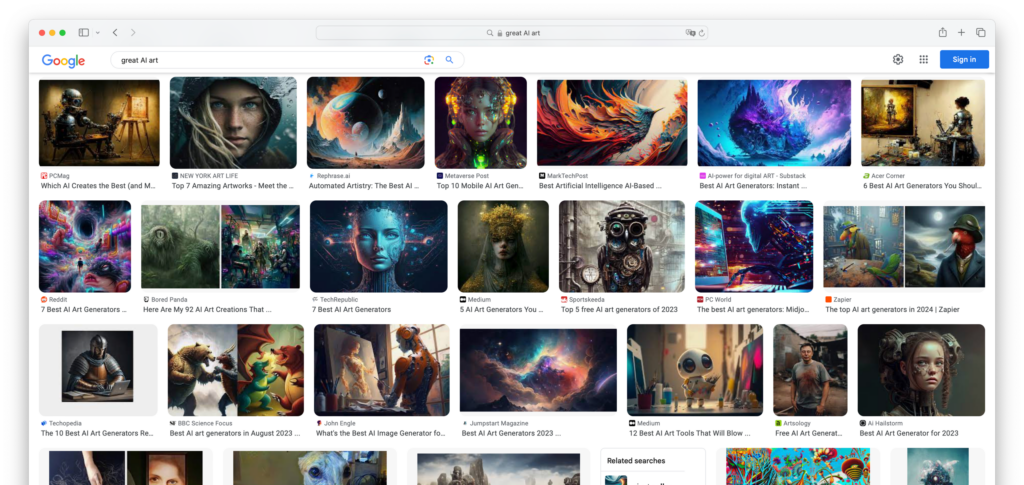After looking closer at what made the web in 2006, it is time for some bold predictions:
- Apple keeps its iPod monopoly and increases its OS 5% market share to 5.1%
- Google scores against Microsoft and Yahoo due to its massive marketing data advantage
- Blogs bloom, and prepare for the 2008 election
- Social networks become a place where members make money
- Newspapers open up
- Big ad investments start streaming in
- New Internet focused ad agencies open up
- Viruses and spam become an even bigger hassle
- Yet Digital ID initiates a major change that makes the web more reliable, user and investor friendly
- All in all 2007 is a preparation for the big infolution in 2008
1. The Big Battles: Microsoft, Google and Yahoo
Apple is due to release OS Leopard and its much anticipated time machine; Microsoft Vista will have to prove itself against Microsoft Windows XP all while the big battle of the giants involving Microsoft, Google and Yahoo is promising to be the real big spectacle.

1.1 Solid Apple, endangered .Mac
Launching Leopard with it’s amazing backup system called time machine and the long awaited screen resolution independence, the iPhone and a maybe new button free big screen generation III video iPod, Apple will further solidify its market position. Not more.
The .Mac operation will die a slow death if it doesn’t substantially improve in terms of speed, spam, reliability and service. Why should I pay for a .mac mail-address if I can have it all and spamfree on gmail.com? Maybe Apples newest board member, Google CEO Eric Schmidt will have some good influence there.
The Zune will be soon forgotten, but iTunes needs some cleaning up, in order to push Zune into the grave where it belongs. Of course Microsoft will try a stubborn over-sponsored counterattack with a Zune II, just as they did with the Xbox.
1.2 Microsoft under heavy attack
Just as the Zune competes with Microsoft’s previous play for sure media standard, Vista competes with Microsoft’s previous software products, namely its database driven products, while for starters the Zune was not compatible with Vista (fixed now). This is as such less crucial as symptomatic.
We all know that against all promises inevitably myriads of viruses will invade Vista sooner than later and given that one major battleground in 2007 is the fight against spam, this will further weigh on the Microsoft brand.
Still, due to its current market share and current software-hardware dependencies Microsoft will hold its position while fighting its fiercest enemy: Google. Google was smart enough to not compete with Microsoft where they are simply unbeatable. The platform business. Their strategic schedule is to hit Microsoft at their Achilles’ heel: The office package.
The reason why Microsoft still holds its monopoly in the platform market is because we all use Office. Office sets the standard for word processing (Word), table calculation (Excel), presentation software (PowerPoint) and Email (Outlook).
Everybody hates Word and PowerPoint, yet we all need to use it and more importantly we all know how to use it. To switch users from a complicated hard to deal with program they have used for years is “against common belief” more difficult than switch users from one easy to use program to another. The best example is QuarkExpress. A nightmare of a program, but as so many designers have spent their digital youth learning it, it took them almost 20 years to switch to an easier program.
1.3 Google uses huge marketing data advantage
Google doesn’t compete with the functionality of MS Office, they compete with the format. In the mean time even Microsoft has realized that the concept of selling 1,500 Dollar CDs in big carton boxes is not working anymore. Google’s launch of online spreadsheets, their acquiring of Writely (online word processing), their teaming up with Firefox and their strong march in the freemail sector have to be read as a full on declaration of war to Microsoft. While Microsoft seemed invincible just a year ago, Google slowly takes over the role of the giant from Redmond.
Microsoft is actively trying to get into the online applications business with its Windows Live project. Microsoft used most of their resources making their OS and its applications look fancier—thus mostly engaging in early 2000 virtues.
In the mean time Google has continuously improved IA, interface and interoperability of their software—thus investing in more contemporary software virtues.
Once Google’s online applications are as easy to use and fully compatible with the latest Office suite, companies will start switching to Google’s office, as it’s much cheaper and needs less training costs.
This going is more likely to get tough in 2008 as companies are typically slow when it comes to software trends. Yet some smaller projects (Zoho, Zimbra, ThinkFree) might accelerate the trend if they manage to make their products as self dynamic as YouTube. Google will have to watch out to not lose focus though. Keep their core competency (search) and observe Mozilla and Adobe:
The days of purely desktop-based applications are clearly numbered, but so are the days of exclusively web-based apps. Both Microsoft and Google are racing toward a happy medium. However, they aren’t the only players in town, not by a long shot. Both Mozilla and Adobe are well positioned to take advantage of desktop and web convergence. Companies offering solutions that connect desktop and web apps together will get their chance too. Calendaring and project management are two obvious choices, but every productivity app deserves to be re-examined.
1.4 Yahoo forced to change radically
Online Yahoo is still market leader and one might wonder why. Their latest redesign is a superficial AJAX farce, their overall usability has become one of the worst around. Whenever I want to try one of their new products I have to go through an unimaginably painful process retrieving my password.

And this is the main reason why they lost against Google in the adwords section. While Google adwords are intuitive and understandable, Yahoo’s search marketing service (formerly Overture) is a mere nightmare. Due to the recurring frustration, I haven’t used it in months, so pardon me if it’s better now. Yahoo has demonstrated that by just acquiring successful websites (Flickr, delicious) you don’t necessarily move forward the core brand. The whole concept of horizontal portals is overdue, and thus, when acquiring successful projects, you should try to keep the developing dynamic that made them great.
If Microsoft and Yahoo will not substantially change their hierarchic decision structure and open their managerial structures, they will lose substantial market share in 2007. Google’s management advantage resides in its democratic decision structure:
“Google doesn’t have a dictum,” Warren said. But “three months is a forever timeframe for Google,” he added (which may or may not have been a dig at Microsoft’s five-years-and-counting Vista development timeframe). Warren described Google as being “engineering-centric”, with more than half of its total number of employees performing non-management/non-administrative tasks. As such, it’s tough to grow, he acknowledged. Google also takes the “flat organizational structure to an extreme”, he said. […] He noted that individuals with ideas for new development projects must first submit their idea to an internal mail list, where 200 of their peers provide constructive criticism before any coding takes place.
And at this point it won’t help Microsoft to buy Yahoo, as a bigger Microsoft will be an even less flexible, less democratic Microsoft.
2. Trends
We have observed the rise of social networks and the democratization of the web. And the social engineers, secretly paid bloggers and old world propagandists were right there putting up fake blogs and trying to control and milk new media. The good news is that they failed and will fail even more as the democratization of information has become unstoppable.
What has happened in 2006 is comparable to the early events of 1966 and if history repeats we might see a summer of love for the Internet coming along in 2007 leading to a more violet revolution in 2008 during the presidential elections.
2.1 Newspapers will have to open up
What we experienced in 2006 was just a first round in wild independent journalism. The newspaper will learn to integrate their readers and act as filters with the help of their readership. That they have not figured out yet how to do that is nothing else but pathetic. Wasn’t the reader’s opinion section always the most read section of a newspaper (at least in Switzerland that is the case). The first Newspaper that manages to integrate key readers as democratic representatives of their readership, while building up an interactive base concept in how they generate and structure content—will rule the online landscape of newspapers.
Newspapers are still far easier to read than online information. Imagine what the New York Times could be if it leveraged the intelligence of its readership. Imagine how that paper would sell. In order to get quality content, all they need to do is pay the contributors.
2.2 Blogs will continue to grow
More and more people will realize how easy it is to write. Losing the fear of written language, as taught in schools for years and years, we will see new bloggers rise like phoenixes out of the ash. Those talented spirits insulted and terrorized for their problems with grammar and spelling will realize that creativity has become an asset that develops amazing powers beyond their closed circle of friends. With more wild people writing the hierarchical structures will be further questioned and the web as such will get a further boost.
 alt “Blogs will continue to grow”)
alt “Blogs will continue to grow”)
2007 is the year where bloggers are starting to make serious money, as online advertisement will significantly rise (see below) and companies discover them as ad platforms.
2.3 Social Networks will become financially social
From what I see and hear, Facebook has the biggest potential to establish itself as the non-dating network with a global impact. Personally, I believe that the biggest step they can take is to go multilingual, which is, one big development that is yet to come (see below).
If Facebook manages to not sell and instead monetize intelligently and finds an innovative way of paying back their users for quality contribution (and they certainly do have the right user base to expect quality contribution), they are going to be the Internet act of 2007.

MySpace and Orkut will continue to ferment into the ultimate dating platform, but there is not enough substance to reach an adult audience. Second life will gain a lot of steam during the first half of 2007 and then flatten down back to where it is right now.
2.4 Internationalization: Digg and Flickr in Japanese?
More obvious than the semantic web (which will come without us even noticing—Google is pretty much there anyways) is a multiplication of languages for successful web projects. Of course translating the interface will not do. In order to make websites work in different languages websites will have to develop different mindsets they can be used in.
I can’t wait to see Flickr, reddit, Facebook, Digg, YouTube or delicious in Japanese.
3. More Money for Online Advertising
Yes, we’ve heard it many times before. Online advertising is growing, yet today the budgets attributed to online advertisement can hardly compete with radio budgets. The World Advertisement Research Center (WARC) forecasts the online advertisement will close the gap with radio advertisement.
3.1 Internet advertisement closing the gap with radio advertisement?
While companies spend an average of 3.7 Billion on search engine advertisement, the average budgets attributed to regular online advertising are—compared to classic print or TV advertisement—nothing but a (bad) joke. Seriously, who listens to radio advertisement? iA is so confident that things will change this year much more dramatically than announced by WARC. Old marketers that believe that TV ads work will have to be replaced sooner than later will start to die out.

3.2 The fall of the first TV stations
The rise of YouTube is just a first step in what has become inevitable. After eating a large amount of print, radio and music, the Internet is hungry for TV. Apart from the unstoppable P2P piracy, the uber power of iTV, funny amateur news, soaps and expert shows the real threat for TV stations are the marketing budgets that will sooner or later be seriously cut. In its special Edition on the World in 2007 The Economist states:
Indeed, the only thing keeping TV programmers off the sills of their skyscrapers is the fact that the source of their income, marketers, have not embraced web video as quickly as have the viewers. Each year advertisers collectively pay more and more for a smaller and smaller audience. This phenomenon has defied economic gravity for so many years now that few even comment on the absurdity of the whole thing (to say nothing of the risible model of interruption-based TV advertising itself: annoying 90% of the audience for the sake of reaching 10% who might care about your product makes sense only when you’ve got a captive audience, which is no longer true).
Currently online advertisement is seriously undervalued. Financially as well as in terms of market reach and efficiency. Part of the inflation in the online ad market goes back to the omnipresent Google ads with the misconception they created in terms of the function of online advertisement (Pay per Click) and the devaluating effect it had on online advertisement at first.
On the other hand Google adwords has helped the overall distribution and acceptance of online advertisement. As Google adverts are getting more (and that is: reasonably) expensive, online advertisement is catching up. Fortunately brand owners have learned to discern and value brand exposure on premium spots compared to mere traffic generation through search engine marketing programs.
3.4 The rise of new ad agencies
Of course nothing will change as long as the old priest of linear media have control over marketing budgets and ad agencies.
Globally there is a substantial lack of talented online marketers and ad strategists. The first agency who nails the concept of substantial online advertisement is promised to have a golden 2007. It is more likely to be a new than an old agency. As making an ad agency an interactive ad agency is as difficult as turning a horse into a car.
If Internet advertisers got paid as much as classic advertisers, you’d see much better web ads online. And you will.
4. Wow: Digital Identity for the Trusted Web
With the rising political relevance of the web, identity becomes a more and more important factor. Currently, most abuses go back to the fact that people can use fake identities. I am not sure if the web is ready for this, but I am sure that the introduction of clear referable web identities would solve a lot of problems.
4.1 The really big thing: Digital ID
The new identity system would require anyone that posts anything on the trusted web to identify himself. Anonymous reading would still be possible, but anyone that wants to contribute to a discussion, send a mail, post a text, video, picture on the trusted web would have to identify himself.
You could still run anonymous blogs but if you read them you’d know from the start that there is some phony business going on there. Of course identified websites should get a better search ranking.
4.2 Nothing scary about that
This sounds kind of scary, but actually it is not. Serious websites, blogs, etc. would have to join the trusted web. And in return those websites would get a traffic boost. If you want to surf the dark web, you’re free to do so on your own risk. Viruses and mail spamming could be instantly reduced to a minimum.
Mail clients would reject any mail without an identity code. Of course hackers would try to trick the identity code, but if it is connected to a social security number of a credit card ID the abuse can be reduced to a minimum. But what am I boring you with details: Just watch this inspiring video:
If you think you know all about ID, just watch it to see how to hold a contemporary presentation. If 2007 is as fast as 2006—and why should it not?—all my predictions are too tame. We might be in the middle of the infolution already. If you look at the loudest websites in 2006, that may just be the case.





